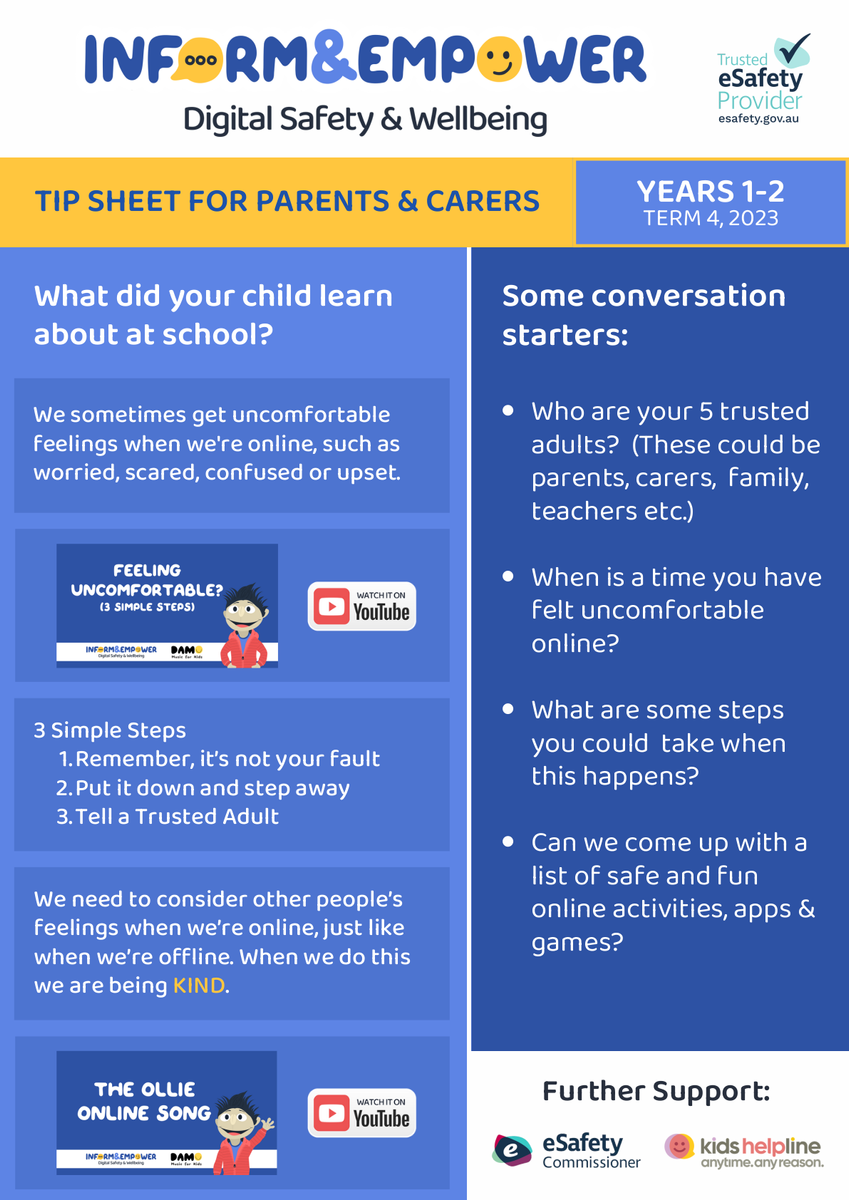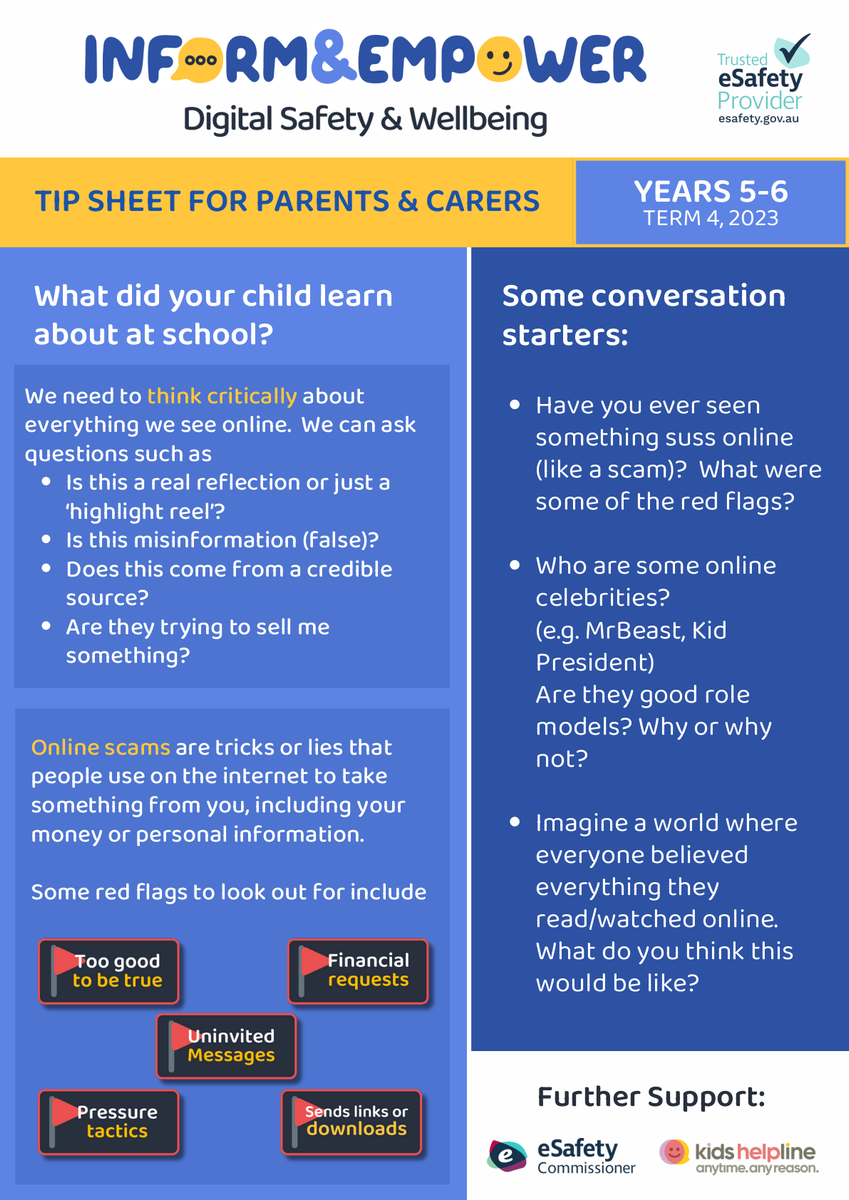OPS Education Space

Cyber-Safety
Each term the Year 1-6 students participate in a webinar on Cyber-Safety run by the crew at ‘Inform and Empower’. It is highly interactive and generates a lot of discussion and sharing of ideas and experiences online. The years 3-6 students really enjoy the Kahoot at the beginning of every session and occasionally, Ormond Primary School has had one of the winning players! Of course, they all play under a creative username as it would be irresponsible to post their actual name online to hundreds of people they didn’t know.
Here is a run down of the sessions year levels covered this term. There is a link to the Parent Tip Sheet for each year level and for the Year 1/2s there are links to the songs they have been singing! We have reengaged ‘Inform and Empower’ for 2024 when a new rotation of webinars will be available.
Years 1/2 - Ollie Online
Ollie and Marty explore how some of the things children might see online can make them feel uncomfortable. But how do they know that they are feeling uncomfortable? Ollie and Marty talk about how our bodies give us ‘early warning signs’ that help tell us we are feeling uncomfortable about what is happening or what we are seeing. These could include: a sore tummy, sweaty palms or a quickened heartbeat. Content could be from a website, a video, a game and messages sent from other people. If your child is confronted with content that makes them feel uncomfortable, they have been given the following 3 Simple Steps.
- Remember, it’s not your fault
- Put it down and step away
- Tell a Trusted Adult
We need to consider other people’s feelings when we’re online, just like when we’re offline. When we do this we are being KIND. It is important that children consider how the choices they make online can impact other people’s feelings. This could include typing a mean comment or excluding them from a game.
Activity to do with your child
Can we come up with a list of safe and fun online activities, apps & games?
Songs the children sang during the Webinar
- Who Could It Be (on the internet with me)? (Click title for link)
- The Ollie Online Song (Click title for link)
Year 3/4 - Adventures Online
In this episode, Marty and Laura discuss the importance of keeping personal information private and also about being aware of online scams and hackers. They discuss how easy it can be to be ‘tricked’ into handing over personal information that could lead to some very nasty consequences. It was also recognised that everyone has a choice as to whether they fill in or hand over that information so this episode focused on getting to know what personal information is and strategies for keeping children’s identity hidden. Personal Information could include:
- Full name
- Address
- Date of Birth
- Passwords & Usernames
- Parent’s Name(s)
- Pictures/videos of themselves
- School they go to (photos in school uniform)
- Places they play and what time they go there
A really effective analogy was used to explain the difference between scammers and hackers. A hacker is like a burglar who breaks into your house by forcing their way inside to steal things. A scammer is like someone who has tricked you into handing over your house keys and robs you that way.
When faced with a situation where they are asking for personal details, consider the possibility of it being a scam. Is it a reliable app? If it is an email asking you to verify your account details for a particular service, is the email coming from the actual company or do you even have a subscription? Before you enter any information STOP and think about it. If it sounds too good to be true, it probably is!
Discussion to have with the family
What information should you keep private online? Why is this important?
Years 5/6 - Thrive Online
In an online environment that is filled with Youtubers and Influencers, it can be really easy to be drawn into the messages and products they promote. But just because someone has millions of followers doesn’t mean that what they are promoting is any good. This episode looked at the role influencers play in what their viewers or followers think, do and purchase. The children were invited to think about what a content creator is and how easy it is to post anything online, even information that isn’t accurate or truthful. Anyone who posts creative content online is a content creator and the internet allows easy access to their content. Nowadays we not only have to navigate content created by people, we also have to consider what Artificial Intelligence posts.
We need to think critically about everything we see online. We can ask questions such as:
- Is this a real reflection or just a ‘highlight reel’?
- Is this misinformation (false)?
- Does this come from a credible source?
- Are they trying to sell me something?
Discussion to have with the family
Imagine a world where everyone believed everything they read/watched online. What do you think this would be like?
Delia Robey
Year 3 and 4 PLC Leader, Education Sub Committee Convenor



